9 ways to wake up without coffee
Boost your morning mood with these easy, expert-approved tips.
Updated on December 20, 2022

There’s nothing worse than the sound of an alarm clock—unless you count actually having to roll out of bed.
If you have a hard time waking up, or you’re always grumpy when you do, a healthy morning routine can boost your morning mood and leave you productive for the rest of the day. Here are nine secrets for rising and shining.
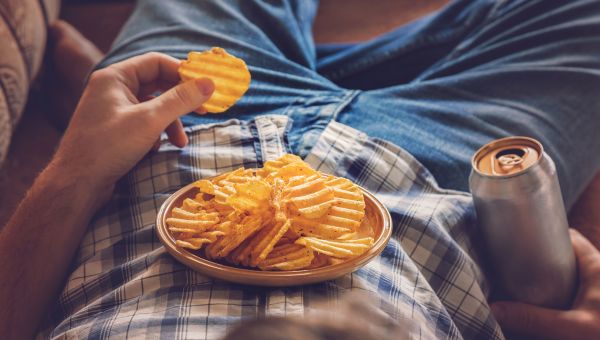
Skip these things before bed
One of the best ways to help improve your morning is to practice healthy habits at night. “Avoid caffeine, alcohol, sugary drinks, and eating anything at least three hours before bed,” says Radhika Vayani, DO, an internist in Fort Worth, Texas. Doing so will also help minimize the number of times you wake up during the night. A good night of rest will help you wake up feeling refreshed and ready to start the day.
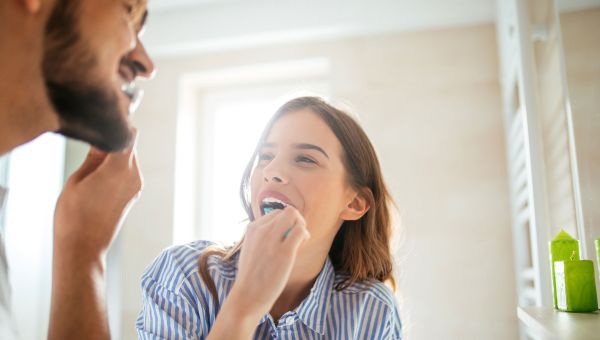
Brush your teeth
The coffee pot may be the first thing you run to in the a.m., but Dr. Vayani says that a better idea after waking is brushing your teeth. “When you’re sleeping, you get dehydrated, your mouth is very dry,” she explains. “The drier our mouths are, the more bacteria there is in our mouths and on our tongues.” She recommends brushing your teeth for two minutes first thing in the morning, paying special attention to your tongue. “Brushing your tongue has been shown to help get rid of the bacteria,” she adds.
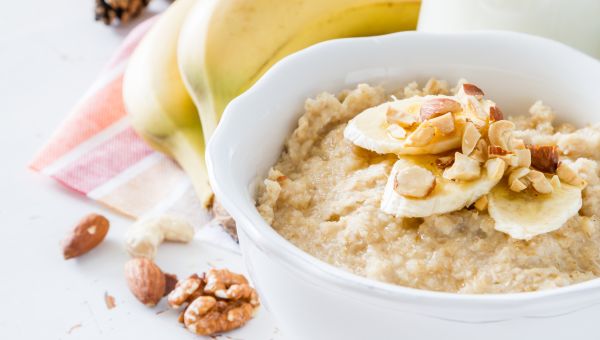
Fuel up the right way
Breakfast revs up your energy levels and may prevent you from eating more later in the day, says Vayani.
One 2018 study published in Current Developments in Nutrition found that eating breakfast not only improved satiety (fullness), it also appeared to lead directly to better sleep quality. And better sleep can mean waking up happier. Aim for a breakfast that includes complex carbohydrates, protein, and a little bit of fat.
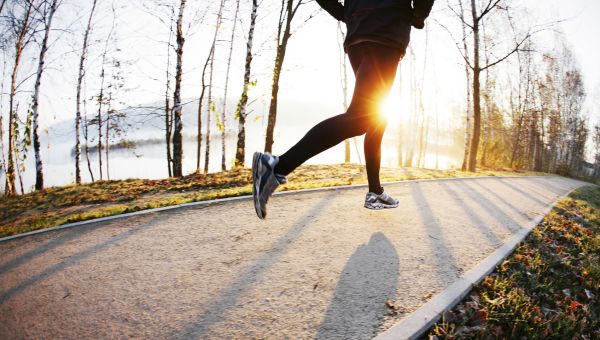
Exercise
Exercising in the morning—even just for a few minutes—may help you start your day on the right foot, too. Working out will increase our endorphins in our brain and elevate our moods, says Vayani.
And if you just can’t get out of bed in time to exercise, try stretching for a few minutes. Stretching can help calm your mind and reduce any muscle stiffness you have first thing in the morning. Regular stretching improves your posture and flexibility, reduces your risk of injury, and helps promote good blood circulation, too.
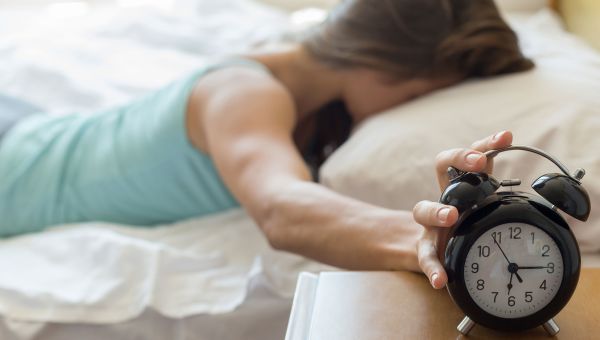
Change your tunes
The loud, beeping alarm you hear each morning may be causing you some stress. Set your alarm sound instead to peaceful noises like birds chirping or waterfalls. “These softer, soothing noises have been shown to produce calmness within ourselves,” says Vayani.
And turn up your favorite tunes. Music actually increases antibody levels, which may elevate emotions, improve immunity, and reduce your stress hormone levels. A very small 2019 study published in Frontiers in Psychology showed that when you’re actively trying to be happier, upbeat or calming music can help. Tune in to your favorite channel or playlist while you’re getting ready in the morning, and pick happy songs for your commute too.

Try mint
Vayani personally recommends a scent like mint to elevate your mood, increase your attention span, and improve your alertness.
Using an essential oil diffuser next to your bed or chewing a stick of peppermint gum after you brush your teeth may help improve your attentiveness in the morning.

Rearrange your nightstand
If you don’t have pictures or mementos on your nightstand, it might be worth adding some. Your brain and heart will thank you.
Why? Many studies support a link between a strong social network and improved mental well-being. Mementos of that network could serve as a reminder of those relationships. “When you wake up, looking at pictures on your nightstand can bring about a feeling of nostalgia and that causes calmness in your brain and may elevate your mood,” says Vayani.
Spend some time choosing meaningful photographs and keepsakes to help provide a little extra lift in the a.m.
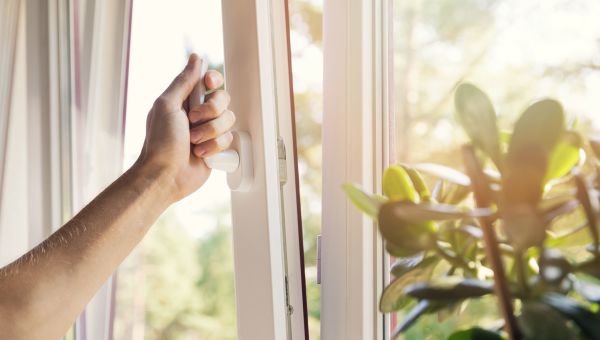
Get some sunshine
When you’re having trouble waking up, light can be your best friend. “Turn on your bedroom light, open whatever shades you can, and just let the sunshine in,” says Vayani. A walk outside can work wonders too.
When you’re exposed to light first thing in the morning, your body’s level of serotonin, a neurotransmitter in the brain that also acts as a hormone, rises. Higher serotonin levels boost your mood and energy levels and may even help you get a good night’s sleep later on.

Smile
Remember that mornings can be hectic for everyone. “Try to consciously tell yourself to stay calm and to think of the good stuff in life. Take some deep breaths and smile,” says Vayani. Some research suggests the act of smiling may actually put you in better mood. And all that smiling may rub off on your family and friends, too.
And whether you need to vent or just want to brighten your mood, take five minutes and reach out to someone who makes you happy in the morning. It’s a win-win for both of you.

Iao S, Jansen E, et al. (2022). Associations between bedtime eating or drinking, sleep duration and wake after sleep onset: Findings from the American time use survey. British Journal of Nutrition. 2022. 127(12).
National Institute of Dental and Craniofacial Research. Dry mouth. Accessed on November 7, 2022.
Choi HN, Cho YS, et al. The effect of mechanical tongue cleaning on oral malodor and tongue coating. Int J Environ Res Public Health. 2021;19(1):108.
Gwin JA, Leidy HJ. Breakfast consumption augments appetite, eating behavior, and exploratory markers of sleep quality compared with skipping breakfast in healthy young adults. Curr Dev Nutr. 2018 Aug 28;2(11):nzy074.
Ruddick-Collins LC, Morgan PJ, et al. Timing of daily calorie loading affects appetite and hunger responses without changes in energy metabolism in healthy subjects with obesity. Cell Metab. 2022 Oct 4;34(10):1472-1485.e6.
Ren Z, Cao J, et al. Association between breakfast consumption and depressive symptoms among Chinese college students: a cross-sectional and prospective cohort study. Int J Environ Res Public Health. 2020 Feb 29;17(5):1571.
Mayo Clinic. Exercise and stress: Get moving to manage stress. August 3, 2022.
South Dakota State University Extension. Benefits of Stretching. Updated June 30, 2022.
Thoma MV, Mewes R, et al. Preliminary evidence: the stress-reducing effect of listening to water sounds depends on somatic complaints: A randomized trial. Medicine (Baltimore). 2018 Feb;97(8):e9851.
Zhang A, Zou T, et al. The immune system can hear noise. Front Immunol. 2021 Feb 18;11:619189.
Stewart J, Garrido S, et al.. Music Use for Mood Regulation: Self-Awareness and Conscious Listening Choices in Young People With Tendencies to Depression. Front Psychol. 2019 May 24;10:1199.
Kwon S, Ahn J, Jeon H. Can Aromatherapy Make People Feel Better Throughout Exercise? Int J Environ Res Public Health. 2020 Jun 24;17(12):4559.
NIH: National Institute for Complementary and Integrative Health. Peppermint Oil. Last updated October 2020.
Cavanagh SR, Glode RJ, Opitz PC. Lost or fond? Effects of nostalgia on sad mood recovery vary by attachment insecurity. Front Psychol. 2015 Jun 10;6:773.
Burns AC, Saxena R, et al. Time spent in outdoor light is associated with mood, sleep, and circadian rhythm-related outcomes: A cross-sectional and longitudinal study in over 400,000 UK Biobank participants. Journal of Affective Disorders. December 2021. Volume 295, pp. 347-352.
Coles NA, March DS, et al. A multi-lab test of the facial feedback hypothesis by the Many Smiles Collaboration. Nature Human Behavior. 2022. 6, pages 1731–1742.
Coles NA, Larsen JT, Lench HC. A meta-analysis of the facial feedback literature: Effects of facial feedback on emotional experience are small and variable. Psychol Bull. 2019 Jun;145(6):610-651.
Wang J, Mann F, et al. Associations between loneliness and perceived social support and outcomes of mental health problems: a systematic review. BMC Psychiatry. 2018. 18(156).
Szkody E, Stearns M, et al. Stress-Buffering Role of Social Support during COVID-19. Family Process. November 2020. 60(3):1002-1015.
More On


video

article

slideshow


video


video
